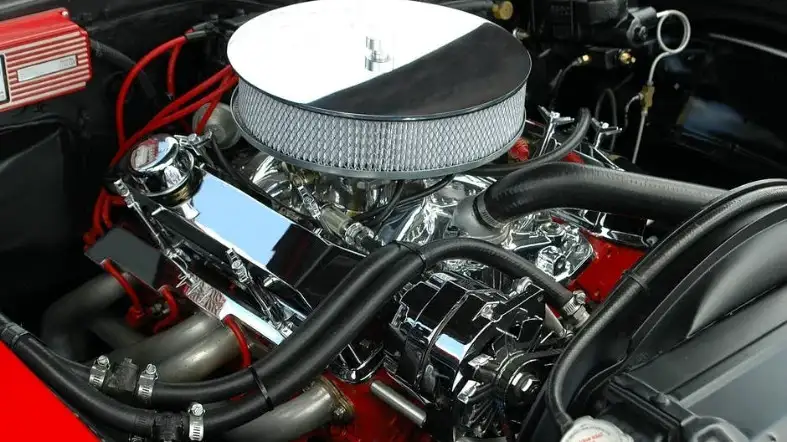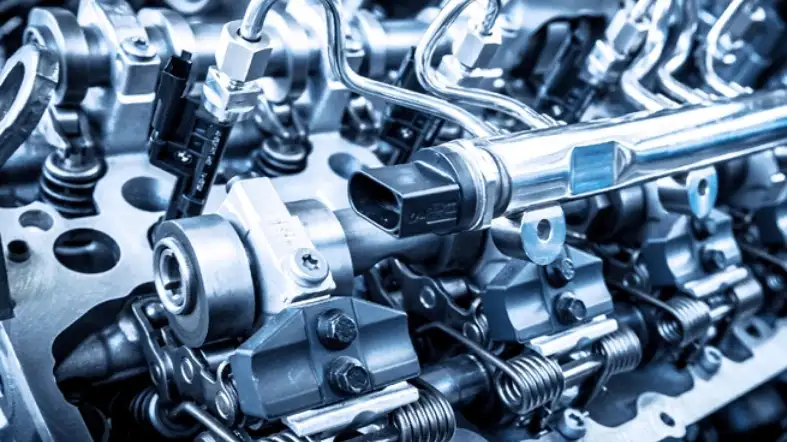Are you wondering, “How To Increase Horsepower On A 350 Engine?” Look no further!
Whether you’re an automotive enthusiast or seeking more oomph under the hood, this article is your guide to maximizing power.
Discover tips like upgrading your air intake system and exploring performance enhancements. Get ready to unlock your engine’s potential let’s dive in!

How To Increase Horsepower On A 350 Engine?
Here are some options that will help to Increase the Horsepower of your engine:
Upgraded Air Intake System
Installing a high-flow air intake system can improve airflow to the engine, allowing for better combustion and increased horsepower.
Consider upgrading to a cold air intake or a performance air filter.
Exhaust System Upgrade
Upgrading your exhaust system can help improve engine efficiency and increase horsepower.
Consider installing headers, high-flow catalytic converters, and a performance exhaust system to reduce backpressure and enhance exhaust flow.
Performance Camshaft
Installing a performance camshaft can significantly increase horsepower.
A camshaft with a higher lift and longer duration can improve valve timing, allowing more air and fuel to enter the combustion chamber.
Cylinder Head Modifications
Upgrading the cylinder heads can improve airflow and combustion efficiency.
Consider porting and polishing the cylinder heads or installing aftermarket performance heads designed for better airflow.
Performance Tuning
Get your engine tuned by a professional tuner who can optimize the fuel and ignition timing to maximize horsepower.
This can be done through an aftermarket engine management system or by reprogramming the factory ECU.
Upgraded Ignition System
Installing a high-performance ignition system can improve spark strength and timing, resulting in better combustion and increased horsepower.
Consider upgrading to performance spark plugs, ignition coils, and ignition wires.
Forced Induction
Adding forced induction, such as a supercharger or turbocharger, can significantly increase horsepower.
These systems force more air into the engine, allowing for more power during combustion.
Internal Engine Modifications
For more significant horsepower gains, consider internal engine modifications such as increasing the engine’s displacement, upgrading pistons and connecting rods, or installing a stroker kit.
Remember, when making modifications to increase horsepower, it’s crucial to ensure that all components work together harmoniously.
Consult with a knowledgeable mechanic or engine builder who can guide you through the process and help you select the right upgrades for your specific engine and goals.

How To Get Rid Of Ants In Car Engine?
Benefits of Increasing Horsepower
When you increase horsepower in a vehicle, you enjoy several advantages. There are several benefits to increasing the horsepower of your engine:
Improved Acceleration
Boosting your car’s horsepower means it can accelerate faster. This is especially useful when merging onto highways or overtaking slower vehicles.
More horsepower allows your vehicle to go from 0 to 60 mph more quickly.
Enhanced Towing Capacity
Increasing horsepower also improves your vehicle’s ability to tow heavy loads.
If you need to haul a trailer or carry a substantial load, higher horsepower ensures your vehicle can handle it more efficiently and with less strain on the engine.
Increased Top Speed
When you add more horsepower to your vehicle, it can reach a higher top speed.
This is important for those who enjoy racing or simply want to experience the thrill of driving faster.
Better Off-Road Performance
Off-road enthusiasts benefit from increased horsepower as well.
It provides the power needed to conquer rough terrain, climb steep hills, and navigate challenging obstacles.
Greater Passing Power
With more horsepower, passing slower vehicles on the highway becomes a breeze.
The extra power means your car can quickly and safely overtake others, making your driving experience more comfortable and efficient.
Enhanced Vehicle Response
Higher horsepower results in a quicker throttle response.
This means that when you press the gas pedal, your vehicle reacts promptly, providing a more satisfying and controlled driving experience.
Potential Fuel Efficiency Trade-offs
However, it’s important to note that increasing horsepower can sometimes come at a cost.
Fuel efficiency may decrease, as more power often requires more fuel. This trade-off is something to consider when deciding to increase your vehicle’s horsepower.
Impact on Engine Longevity
Lastly, adding more horsepower can potentially affect your engine’s longevity.
The engine works harder with increased power, which may lead to more wear and tear over time.
Regular maintenance is crucial to ensuring your engine stays in good condition.
Increasing horsepower in your vehicle offers various benefits, from improved acceleration and towing capacity to a higher top speed and better off-road performance.
However, it’s essential to consider potential fuel efficiency trade-offs and the impact on engine longevity when making this modification.
Maintenance Tips for a High-Horsepower Engine
Some maintenance tips to help you get the most out of your high-horsepower engine
Regular Oil Changes
One of the most important maintenance tasks for any engine is regular oil changes.
This is especially true for high-horsepower engines, which generate more heat and stress on the engine components.
It’s recommended to change the oil and oil filter every 3,000 to 5,000 miles, or as recommended by the manufacturer.
Using high-quality synthetic oil can also help improve performance and protect the engine.
Cooling System Maintenance
High-horsepower engines generate more heat, which means that the cooling system needs to be in top condition to prevent overheating and damage to the engine.
Regular maintenance of the cooling system includes checking the coolant level and quality, inspecting the radiator, hoses, and water pump for leaks or damage, and flushing the system every 2-3 years or as recommended by the manufacturer.
Air Filter Replacement
The air filter is responsible for preventing dirt and debris from entering the engine and causing damage.
In high-horsepower engines, a clogged or dirty air filter can restrict airflow and reduce performance.
It’s recommended to replace the air filter every 12,000 to 15,000 miles, or as recommended by the manufacturer.
Spark Plug Replacement
Spark plugs are responsible for igniting the fuel in the combustion chamber and generating power.
In high-horsepower engines, spark plugs can wear out faster due to the increased heat and stress on the engine.
It’s recommended to replace the spark plugs every 30,000 to 50,000 miles, or as recommended by the manufacturer.
Fuel System Maintenance
The fuel system is responsible for delivering fuel to the engine and ensuring optimal combustion.
In high-horsepower engines, a clogged fuel filter or dirty injectors can reduce performance and cause damage to the engine.
Regular maintenance of the fuel system includes replacing the fuel filter every 30,000 miles or as recommended by the manufacturer, using high-quality fuel, and using fuel additives to clean the injectors.
Transmission Maintenance
High-horsepower engines often require high-performance transmissions to handle the increased power and torque.
Regular maintenance of the transmission includes checking the fluid level and quality, replacing the transmission fluid every 30,000 to 50,000 miles or as recommended by the manufacturer, and inspecting the transmission for leaks or damage.
By following these maintenance tips, you can help ensure that your high horsepower engine performs at its best and lasts for years to come.
It’s also important to consult with a qualified mechanic or performance shop for specific recommendations based on your vehicle and driving habits.
FAQs
Can I Increase Horsepower Without Sacrificing Fuel Efficiency?
No, increasing horsepower often requires more fuel, which can lead to reduced fuel efficiency.
Is It Possible To Boost Horsepower On A Budget?
Yes, boosting horsepower on a budget is feasible through affordable modifications like air intake upgrades and tuning adjustments.
Can I Drive With Reduced Engine Power?
Yes, you can drive with reduced engine power, but it may affect your vehicle’s performance and acceleration.
Does a Chevy 350 Engine Produce 350+ HP?
Yes, a Chevy 350 engine can produce around 350 to 375 horsepower on average.
Do I Need to Upgrade My Engine’s Cooling System for More Horsepower?
Yes, upgrading the cooling system is essential for high-horsepower engines to prevent overheating and maintain performance.
Are Regular Oil Changes Important for High-Horsepower Engines?
Yes, regular oil changes are crucial for high-horsepower engines to reduce wear and maintain optimal performance.
Is Forced Induction the Most Effective Way to Increase Horsepower?
Yes, forced induction, such as a supercharger or turbocharger, is one of the most effective ways to significantly increase horsepower.
Final words
Increasing horsepower on a 350 engine is rewarding. Understand the science for better performance. Upgrade intake and exhaust for affordability.
A performance throttle body enhances airflow. Synthetic oil lubricates, and NGK iridium spark plugs boost horsepower.
Beware of added stress on internal parts; consult an experienced mechanic for upgrades.
